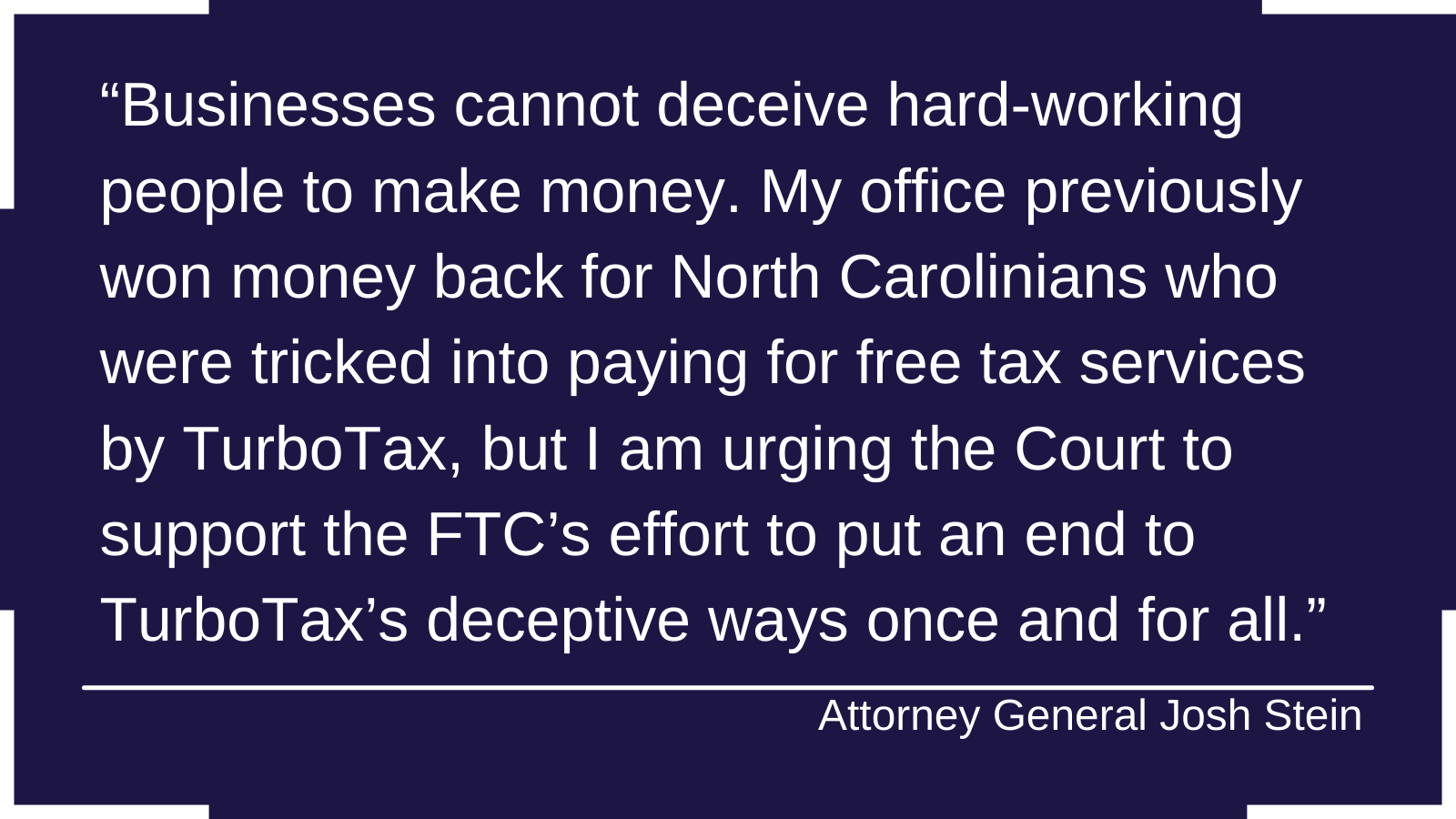
For Immediate Release:
Monday, June 24, 2024
Contact:
Nazneen Ahmed (919) 716-0060
(RALEIGH) Attorney General Josh Stein filed a brief in support of a Federal Trade Commission (FTC) order that bans Intuit, the maker of TurboTax, from deceptively advertising “free” tax preparation software when its services were not actually free for most consumers. In the brief filed in Intuit v. Federal Trade Commission, the coalition of 22 attorneys general argue that the United States Court of Appeals for the Fifth Circuit should reject an appeal filed by Intuit and uphold the FTC’s order.
“Businesses cannot deceive hard-working people to make money,” said Attorney General Josh Stein. “My office previously won money back for North Carolinians who were tricked into paying for free tax services by TurboTax, but I am urging the Court to support the FTC’s effort to put an end to TurboTax’s deceptive ways once and for all.”
Attorney General Stein was on the executive committee of states investigating Intuit. In 2022, he and all 50 states and the District of Columbia reached an agreement with TurboTax for deceiving people into paying for tax services that should have been free. In 2023, the FTC issued an order requiring Intuit to stop advertising products as “free” unless they are free to all consumers. Intuit has appealed and is seeking to overturn the FTC’s cease and desist order.
In the brief, the coalition of attorneys general argues that the court should uphold the FTC’s order against Intuit because:
- Intuit harmed millions of Americans: The brief describes how Intuit manipulated search results to lure consumers into paying for tax prep software even if they were eligible to file their taxes for free as part of a program for active-duty servicemembers, veterans, or low-income taxpayers. Intuit made millions of dollars in profits from low-income taxpayers and military families who would have been eligible to file their taxes for free but who instead paid Intuit to file taxes. Intuit also deceived millions of consumers by running a multi-year nationwide advertising campaign that repeatedly and falsely depicted TurboTax as free when it was not free for the majority of consumers.
- The FTC correctly applied rules protecting consumers: Intuit claimed that the FTC made legal errors when applying rules against deceptive business practices. The attorneys general refute these claims, arguing that the FTC correctly applied basic principles of consumer protection law, and that Intuit’s repeated claims to offer “free” service when they were not free to most consumers were clearly deceptive. The attorneys general also argue that the FTC correctly applied a rule banning businesses from luring consumers with deceptive claims, and that the rule applies to all transactions—including those that take place online.
- State and federal consumer protection enforcers each have a role to play: Intuit claimed that the FTC’s order should be overturned because it is unnecessary in light of the settlement Intuit reached with the states. The coalition argues that this is clearly incorrect. The FTC’s order does not duplicate the settlement with the states—it is different in certain ways. For instance, the order bars Intuit from engaging in a wide range of misleading practices, and requires Intuit to use specific language in ads to ensure consumers are informed that free service is available only for a small group of taxpayers. Additionally, even if there are similarities between the orders, the attorneys general point out that state and federal consumer protection mechanisms are designed to be complementary, and it is very common for a business that misleads and deceives Americans to face consumer protection enforcement from the federal government and the states.
Attorney General Josh Stein is joined in filing this brief by the Attorneys General of Arizona, California, Colorado, Connecticut, Delaware, Hawaii, Illinois, Maine, Maryland, Massachusetts, Michigan, Minnesota, Nevada, New Jersey, New York, Oregon, Pennsylvania, Rhode Island, Washington, Wisconsin, and the District of Columbia.
A copy of the brief is available here.
###
